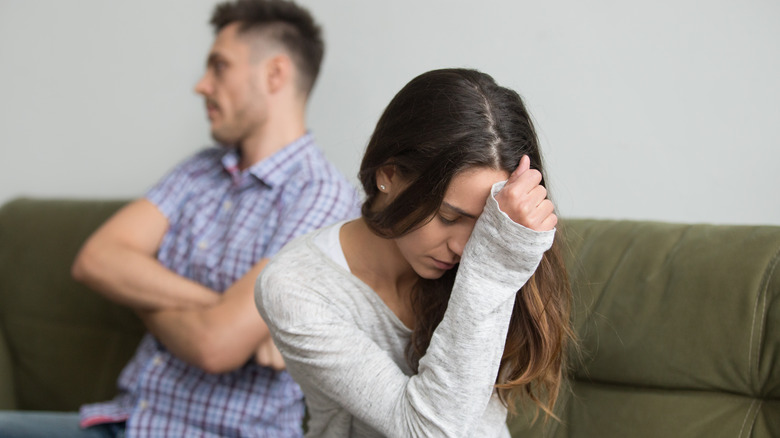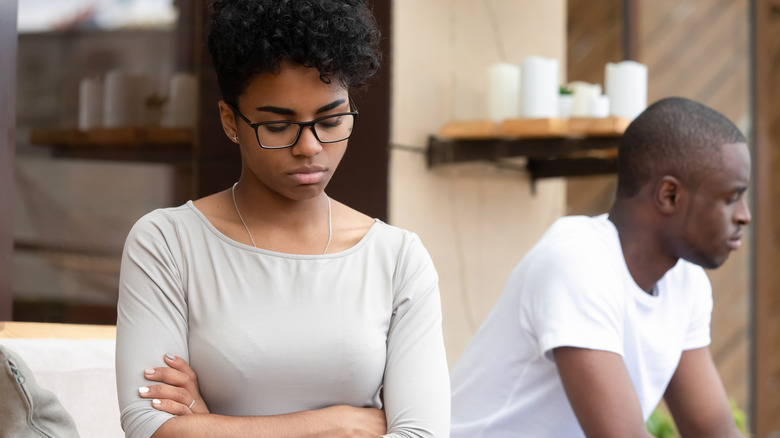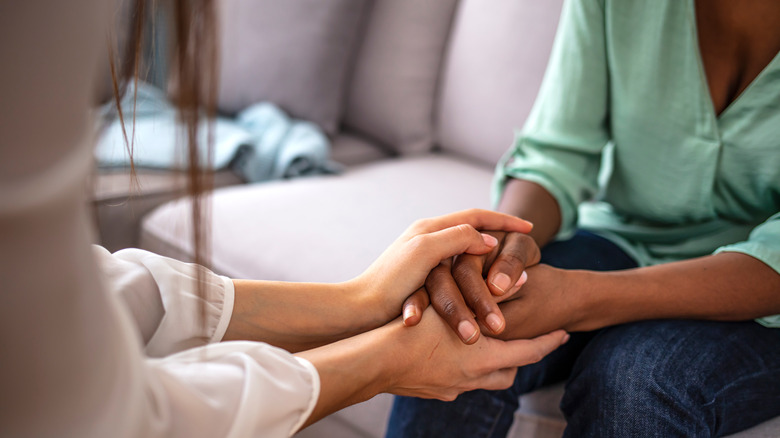How To Date If You Have An Anxious Attachment Style
Dating in today's day and age looks nothing like it once did. While people used to connect with their dates on surface level likes and dislikes, these days, we have the chance to learn more about our partners than ever before. From horoscope compatibility, to love languages, and even our Myers-Briggs personality types (via Very Well Mind), the chance to connect with someone on a deeper level based on fundamental comparisons is more possible than it's ever been before. And, as it turns out, there's even one more personality assessment to add to the bunch that can help you understand your relationships even further.
Attachment styles refer to the way in which we relate to the people in our lives, whether that's family members, friends, or romantic partners. According to SimplyPsychology, the concept of attachment can be understood as the "lasting psychological connectedness between human beings" that often comes from places of affection or emotion. Indeed, studies suggest that our attachment styles — of which there are several — are formed during childhood and will typically stay throughout our lives, ultimately determining how we interact with the people.
According to Mind Body Green, there are four main adult attachment styles: secure, anxious, avoidant, and fearful-avoidant, all of which are on different levels of anxiety and avoidance. Keep reading to learn all about the anxious attachment style.
Here's where experts believe an anxious attachment style might come from
While studies haven't yet been able to identify what specifically creates an attachment style, the consensus suggests that it is developed in early childhood. An anxious attachment style, per Healthline, was most likely developed as a result of inconsistent parenting, insensitivity, emotionally unavailability, or in some cases, simple genetics. During childhood, this attachment style can present itself in various ways, such as clingy behaviors, excessive emotionality, inappropriate interactions with strangers, and generally anxious behavior, amongst others. These early signs can manifest differently into adulthood, from low self-esteem, inability to trust others, jealousy, a need for constant reassurance, and more.
So how do these signs present themselves in relationships, and how would one deal with them? According to Mind Body Green, an anxious attachment style is based on insecurity and a fear of abandonment. "Anxiously attached people tend to be very insecure about their relationships, often worrying that their partner will leave them and thus are always hungry for validation," said Kelly Gonsalves, via the outlet. "Anxious attachment is associated with 'neediness' or clingy behavior, such as getting very anxious when your partner doesn't text back fast enough and constantly feeling like your partner doesn't care enough about you."
Step one? Accept your anxious attachment style
These symptoms of anxious attachment styles might sound debilitating, and in some cases, they can be. But under the right circumstances, they can be dealt with so that you can have the happiest and healthiest relationships possible. Dating in general is quite an anxiety inducing experience, let alone for those with a tendency to gravitate towards jealousy, distrust, and neediness. Here are some of the most effective ways to deal with anxiety in dating and relationships.
First and foremost, accept the reality of your attachment style so that you can begin to deal with it properly. According to sex and relationship therapist Tammy Nelson, PhD, "It's probably a good idea to understand that having an anxious attachment style means that you might be called needy by someone who is avoidant," she explained, per Well + Good, adding, "And sometimes you might act that way. You might push to be attached too soon or feel rejected if someone doesn't call you or want to commit." Look for people who will understand and accept your attachment style, rather than who will make you feel ostracized or judged for it.
Don't feel forced to follow the stereotypical cookie-cutter dating advice, like waiting to call someone after a certain amount of time or avoiding acting too into a person. Nelson said that the healthiest way to deal with your attachment style is by leaning into it and doing what feels natural and comfortable in a relationship.
Therapy can help people with an anxious attachment style
Furthermore, clinical psychologist Lisa Firestone explained that people with anxious attachment styles often end up pushing their partners away from a place of fear, in a sort of self-fulfilling prophecy. Firestone said, "When they feel unsure of their partner's feelings and unsafe in their relationship, they often become clingy, demanding or possessive toward their partner," she explained. This behavior can lead to someone overthinking and misinterpreting every little action by their partners. "They may think, 'See? He doesn't really love me. This means he is going to leave me. I was right not to trust him,'" Firestone said (via Insider). But these behaviors can be broken.
While accepting and confronting your anxious attachment style is certainly empowering, there's nothing wrong with working on adjusting certain aspects of it. Allow yourself to become mindful of your anxious dating trends, and if they're consistently bothering you, make note of them in attempts to adjust them moving forward (via Mind Body Green). Furthermore, clinical psychologist Bobbi Wegner suggested reaching out for help if you find your anxious signs become debilitating, whether that's from a friend, family member, or therapist. "Having an anxious attachment style is really common and something most therapists can help with," she said. "Doing a little work now can save a lot of heartache and headache down the line."



